The father-son bond in The Rifleman remains one of the greatest in TV history, even 60 years later.
For those who grew up in the late 1950s, this Western classic was a must-watch in many homes, teaching timeless values like respect and honesty.
But beyond its powerful moments, The Rifleman also had its share of little-known mistakes, bloopers, and fun facts that only die-hard fans might notice.
Stay tuned as we uncover the hidden gems behind this iconic Western…
Those early Westerns, like The Rifleman, were packed with historical inaccuracies, but who cares? They’re still a blast to watch and offer richer characters than anything on TV today. Every episode delivered a meaningful takeaway, often focusing on basic human values with a heartwarming moral twist.

The Rifleman starred the legendary Chuck Connors as Lucas McCain, a widowed rancher and skilled sharpshooter raising his son, Mark, played by the charming Johnny Crawford. The duo captivated audiences with their heartfelt bond and thrilling adventures in the Old West.
Even though the series has been hailed as one of the greatest ever produced, even the best of the best can have their slip-ups… So let’s take a peek behind the scenes and uncover some things most of us viewers had no clue about!
Lucas McCain a trendsetter
It’s no surprise that cowboy Lucas McCain preferred jeans, but it turns out he was ahead of fashion trends by about half a century! Sharp-eyed viewers might have caught a scene in “End of a Young Gun,” one of the early episodes featuring Michael Landon, where a shirtless Lucas repairs a wagon wheel.
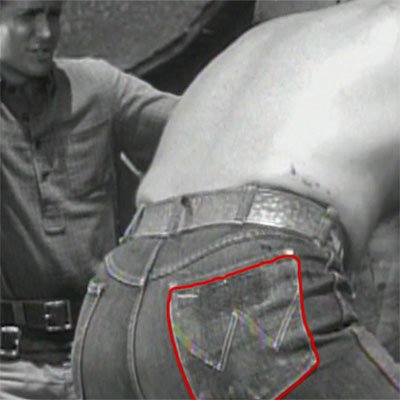
You can see a “W” stitched on the back pocket of his jeans, and yes, he’s actually wearing Wranglers. The catch? The series is set in the 1880s, but those jeans didn’t start being produced until the 1940s. More than just a fashion-savvy cowboy, he Lucas McCain a true trendsetter and definitely ahead of his time!
As I mentioned, one thing I really loved about the show was the father-son relationship. But did you know that Chuck Connors’ real-life son makes an appearance in the series? In the episode “Tension,” Mark and Lucas attends the funeral of Sid Halpern, a friend of the McCains.

The widow and son, Toby, are there dressed in black. It was Jeff Connors, Chuck Connors’ second son with Faith Quabius, who played that young Toby and he had two lines. Sadly, Jeff passed away in 2014.
Getting Chuck wasn’t easy
Casting the lead role in The Rifleman was no easy feat.
Chuck Connors had to outshine 40 other actors, but landing the role was far from guaranteed. Initially, he turned it down due to a low salary offer from ABC, as he could earn more as a freelance actor.
However, Connors eventually secured the role in an unexpected way. It all started when the producers took their children to see Old Yeller, where Connors portrayed a strong father figure. After that experience — presumably with the kids sharing their thoughts — the producers came back with a much better offer, including a five-percent ownership of the show. And just like that, it was all set!
The 1892 Winchester rifle
Every episode of The Rifleman opened with Chuck Connors showcasing his remarkable skills, cranking off a seemingly endless barrage of shots with his saddle-ring carbine. With a dramatic flair, he would spin the rifle, effortlessly toss it from his right hand to his left, and insert a new cartridge, all while giving a menacing stare directly into the camera.
To pull off these iconic scenes, the production utilized two identical 1892 Winchester rifles — one for filming and the other as a backup.
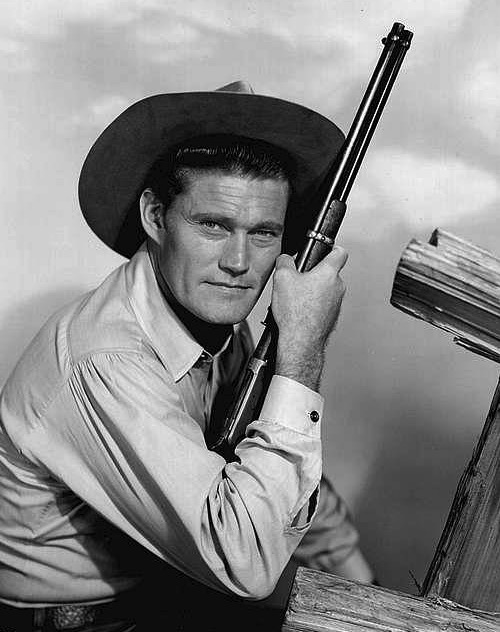
Some might have assumed that the opening scene featuring the 1892 Winchester rifles was trick photography or somehow manipulated. However, the truth is that Connors was genuinely that fast and agile with his carbine. As a former athlete who played professional basketball and baseball in both major and minor leagues before transitioning to acting, he had impressive skills and coordination that made those quick movements look effortless. What we do know though, is that the weapon had been customized to enable rapid firing by cycling its lever action.
The Duke connection
Lucas McCain’s trusty Winchester rifle was more than just a prop; it was a true scene-stealer with an interesting backstory.
The Rifleman took place in the 1870s and 1880s, so it’s impossible for the 1892 Winchester rifle to have existed during that time.
However, this iconic rifle had a previous life on the big screen, making its debut in none other than John Wayne‘s classic 1939 film, Stagecoach. Producer Arnold Levin later revealed the exciting twist: the rifle used by Lucas McCain was the very same one wielded by the Duke in his legendary movie.
The Madera Hotel
The Madera Hotel was a well-known landmark in North Fork throughout the series, frequently appearing in various episodes.
However, in the pilot episode, The Sharpshooter, the establishment underwent a name change to California House. Speculation arose regarding a possible ownership change between episodes, but no one really knows why the establishment suddenly switched names.
Johnny Crawford got blacklisted
At the age of 3, Johnny Crawford made his debut in front of the cameras during an audition. But it wasn’t a success – in fact, he got blacklisted after his performance as a 3-year-old actor.

”I don’t remember the picture and I wound up on the cutting room floor anyway. But I played one of a bunch of refugee children and I was in a scene where Rosalind Russel was supposed to give us all chocolate bars. I think I got blacklisted after this film because the scene had to be reshot and I refused to give back my chocolate bar for the second take,” Johnny Crawford told The Miami Herald in 1973.
”Hazardous” task of casting a new female lead
While widower Lucas McCain primarily focused on raising his son, the series also featured several romantic interests. In the third season, it seemed like Lucas and Milly Scott, played by Joan Taylor, were on the brink of a budding romance.
However, this storyline fizzled out when Milly left the show in season four, with a vague explanation that she needed to head back east.
This left producers in search of a new female lead, introducing the character Lou Mallory. The challenge was to find an actress who not only fit the role but also had undeniable chemistry with Chuck Connors.
To ensure a successful match, Chuck was actively involved in the casting process. However, this turned out to be more challenging than anticipated. Chuck interviewed over a dozen women who seemed perfect for the part but just didn’t quite click.
”A few months ago, I was handed what I thought was a dream assignment. At least it started out on a dreamlike note but almost snowballed into becoming a nightmare,” the actor shared.
After carefully considering over 60 women, the choice ultimately fell to the stunning red-haired beauty Patricia Blair, who hailed from Texas.
Recognize this baseball hall-of-famer?
As previously mentioned, Lucas McCain was an incredibly skilled baseball player. However, he could never match the prowess of former Dodgers star Duke Snider, who made a guest appearance on the show. (Chuck Connors hit only two home runs during his Major League Baseball career).
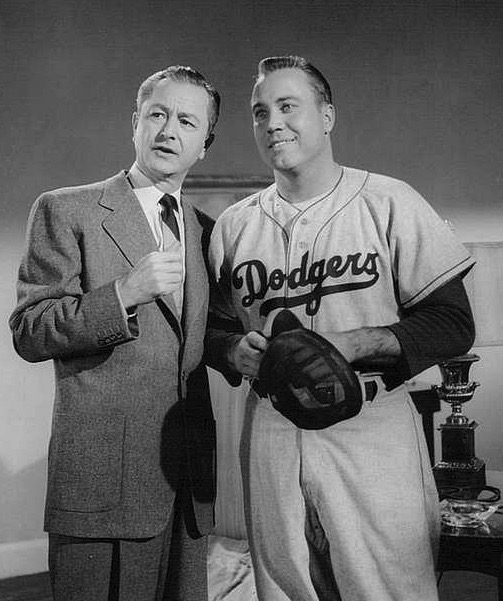
The celebrated baseball player, nicknamed “the Duke of Flatbush,” portrayed the character Wallace in the episode titled The Retired Gun. Another former baseball star who made an appearance on the show was Don Drysdale.
Johnny Crawford’s brother popped up
The Rifleman was heavily centered around family themes, and it was the first network television series to portray a single parent raising a child.
In addition to Jeff Connors, another relative of the show’s stars made an appearance: none other than Bobby Crawford, brother of Johnny.
He played the character Freddy in the episode Second Witness, and both he and Johnny delivered performances so impressive that they earned Emmy nominations in 1959. Bobby, whose full name is Robert Lawrence Crawford Jr., continued his acting career and portrayed Andy Sherman on the NBC television series Laramie from 1959 to 1960. He is still alive today and is 80 years old.
Over-protective of Johnny Crawford
It is already known that Chuck Connors looked after the young Johnny and the two actors kept a close relationship off-screen when the series ended.
From a young age, Johnny Crawford admired Chuck Connors, particularly because of his passion for baseball. Their affectionate bond during The Rifleman became a defining aspect of Crawford’s life, as he learned invaluable lessons from his mentor both on and off the set.
”It was a fascinating part of my education listening to Chuck tell his baseball stories or he’d be reciting Casey at the Bat or he’d be doing speeches from Shakespeare. This always surprises people, that Chuck Connors knows Shakespeare,” Crawford told The Buffalo News.
Their special connection is beautifully captured in the classic photo below, showcasing the deep camaraderie and mutual respect they shared.
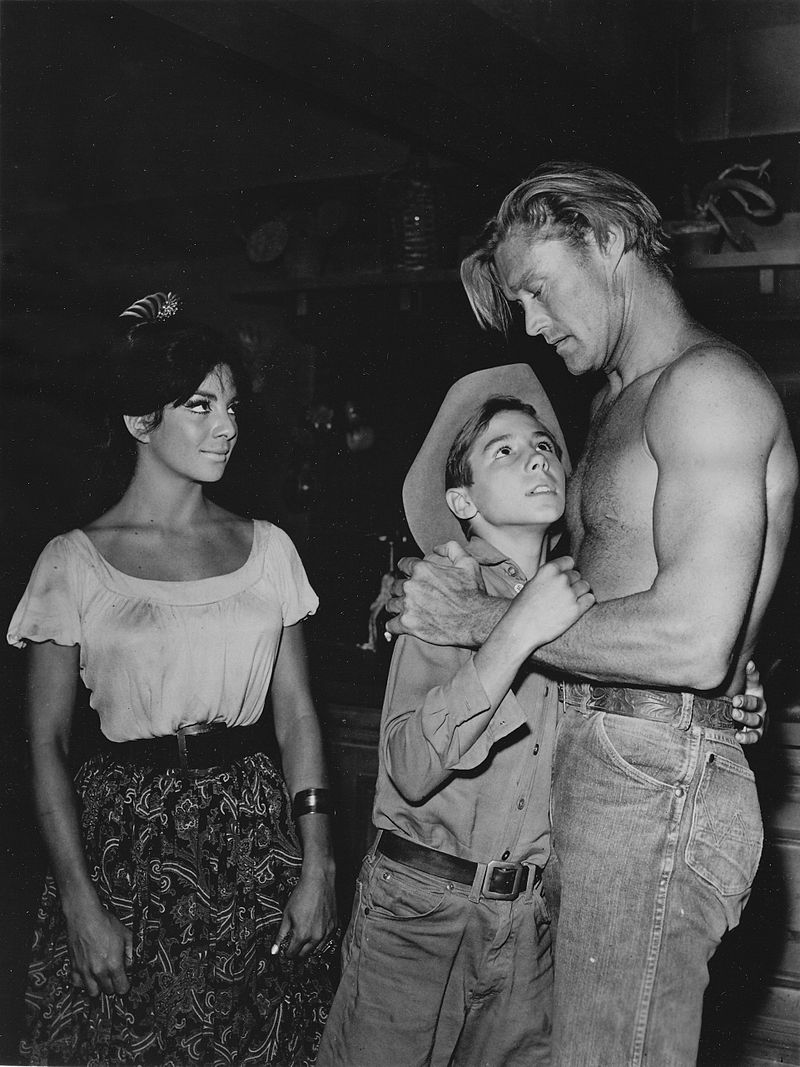
Actor Paul Fix, who played Marshal Micah Torrence on The Rifleman, also felt a great responsibility for Crawford.
During the filming, he became an extra father to Crawford, and he made sure that all the weapons used during the filming were secured. For Paul Fix, his obsession with security around Crawford was personal.
Fix himself had a near-death experience as a young boy when he played around with his brother and a weapon misfired. The bullet was a hair’s breadth from killing Fix; it was a miracle that he survived.
Buddy Hackett twist
In a surprising twist of casting, Buddy Hackett, known for his comedic genius, played the father of an actor who was actually four years his junior.
In one episode of The Rifleman, Buddy Hackett portrays Daniel Malakie, a father who discovers that his two sons, Ben and Jud, have landed in jail. Interestingly, Christopher Dark, who played the “boy” Ben, was born in 1920, while Hackett was born in 1924. This age dynamic makes for some creative casting, proving that Hollywood has a knack for bending traditional family roles and age expectations…
Baby girl was played by a baby boy
Does the name Robert Anacher ring a bell? No? That’s understandable! His most notable role came was when he played the adorable baby girl Fancy in the episode The Baby Sitter. But as it turns out, the girl was actually a boy.
Shot dead with a pistol
In the pilot, which was originally intended for Gunsmoke (1955), Chuck Connors’ character was named John McCain. According to IMDB, he didn’t have any children and was a dead shot with a pistol.
Sammy Davis Jr. impressed the crew
Know as “Mr Show Business” and “the greatest entertainer ever to grace a stage in these United States” – Sammy Davis Jr. is a dearly missed superstar who forever carved himself into American history.
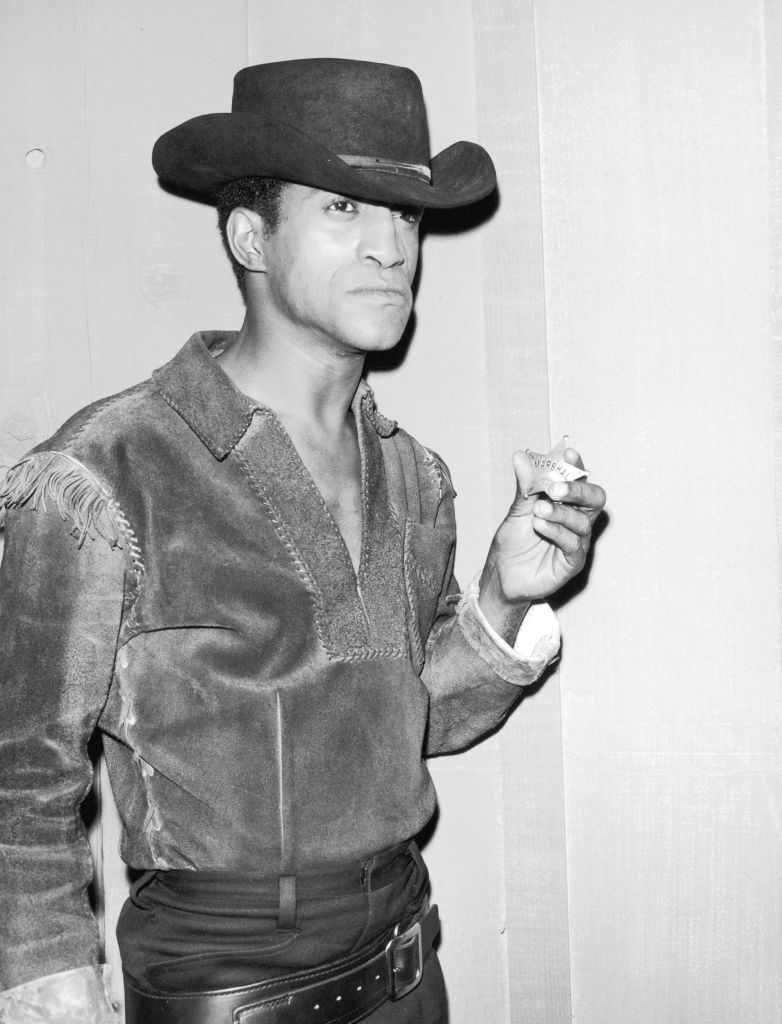
But did you know he made an appearance in The Rifleman? In the episode Two Ounces of Tin, Sammy Davis Jr. portrayed the outlaw Tip Corey. He showcased impressive skills with a gun, demonstrating quick draws and impressive twirling maneuvers. What’s remarkable is that all of these stunts were performed by Davis himself, without a stand-in!
The hair styles
Despite being set in the 1880s, most of the actors in The Rifleman sported hairstyles that mirrored the trends of the 1950s and 1960s, when the show was actually filmed.
This anachronism is further highlighted by the wardrobe choices, as many of the men wore full-front button-down shirts — a style that didn’t even emerge until the 1920s and didn’t gain popularity until the 1930s. It’s a fascinating blend of historical context and mid-century flair that adds an unexpected twist to the classic Western!
Chuck Connors’ headstone
Chuck Connors, renowned for his athletic prowess, smoked three packs of Camel cigarettes daily. Remarkably, he was one of only twelve athletes in history to play both Major League Baseball and in the NBA.
In the fall of 1992, Connors was hospitalized due to pneumonia. Tragically, three weeks later, he succumbed to lung cancer. He was laid to rest at San Fernando Mission Cemetery, where his headstone proudly displays the logos of the three sports teams he represented: the Boston Celtics, the Chicago Cubs, and the Brooklyn Dodgers.
Kevin Joseph “Chuck” Connors (April 10, 1921 – November 10, 1992)He is one of only 12 athletes in the history of…Posted by Hollywood Page Of Death on Friday, November 10, 2023
As we wrap up our journey through the iconic world of The Rifleman, it’s clear that this classic Western series has left an indelible mark on television history.
With its unforgettable father-son bond, memorable characters, and a perfect blend of action and moral lessons, the show continues to resonate with audiences today. I still watch the reruns now. RIP Johnny and Chuck
Shiny Floors without Chemicals: Discover the Cleaning Companies’ Secret!

Have you ever wished you could have flawless, shining floors without using any harsh chemicals, leaving your friends jealous? This desire is definitely attainable, though! We’re finally revealing the pleasant secret that cleaning businesses have been keeping.
Three common household substances can drastically improve your cleaning abilities; bid adieu to costly cleaning supplies. That is correct, of course! You can create a miraculous floor cleaner in less than a minute with just three ingredients that you most likely already have in your kitchen. Furthermore, your house will smell as good as a daisy on a spring morning!

The Handmade Fix: A Comprehensive Guide
Begin by adding half a liter of water.
An excellent potion requires a base. Half a liter of water will work in this situation. It will serve as the foundation for our cleaning masterpiece.
Put One Tablespoon of Salt in It
Whoa, whoa! You can use salt for more than just seasoning food. Because of its gentle abrasiveness and antibacterial qualities, it’s ideal for removing tough stains from your flooring. What a multitasking machine!
Add 100 milliliters of vinegar.
The unsung hero of domestic cleaning is vinegar. This amazing liquid dissolves mineral deposits such as lime scale and serves as a natural grease solvent. What was the outcome? Shiny floors that would make you want to host a party for reflections.
Last Bite: Lavender or Peppermint Oil
Without any fancy ingredients, what makes a decent cleaning recipe? In addition to adding a lovely scent, a few drops of peppermint or lavender oil ensure that your floors are as clean as they look. Finally, mix thoroughly and dilute with five liters of warm water. You possess the ideal non-chemical floor cleaner.
Advantages of This Safe and Environmentally Friendly Chemical-Free Recipe
This place is free of dangerous chemicals! This recipe is safe for your flooring and the environment. Mother Nature will be appreciative!
Simple to Utilize
It shouldn’t take a rocket science degree to clean. All you have to do is use a cloth soaked in this solution to thoroughly clean your floors. Before you can say “shiny floor,” you’ll be finished.
Oil of Lavender for a Calm Aroma
In addition to having an exquisite scent, lavender oil has strong antiseptic qualities. Therefore, your house gains an extra layer of protection and your floors get spotless.
Extra Cleaning Advice for Dimly Lit Floors
Dirt and streaks are more likely to be visible on dark floors. If you want a finish without any streaks, think about using a microfiber cloth or adding a little extra vinegar for shine.
And there you have it—a quick, enjoyable, and cost-free method to give your floors a spectacular appearance without using chemicals or spending a fortune. Cheers to your housekeeping!



Leave a Reply